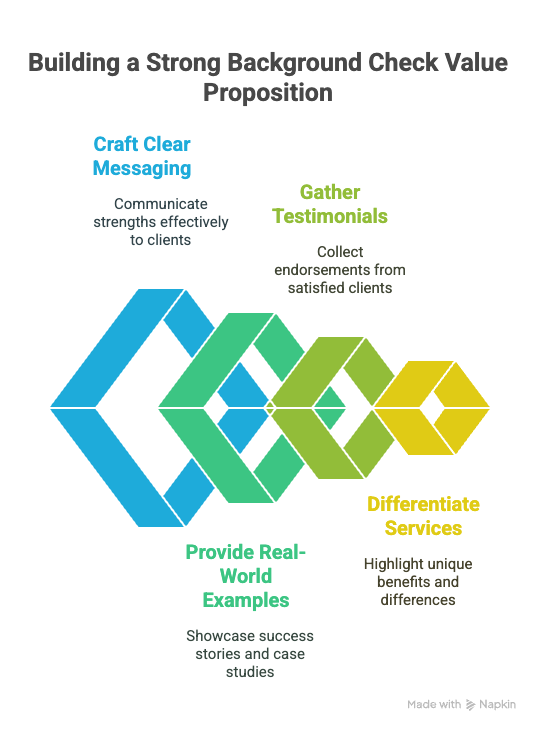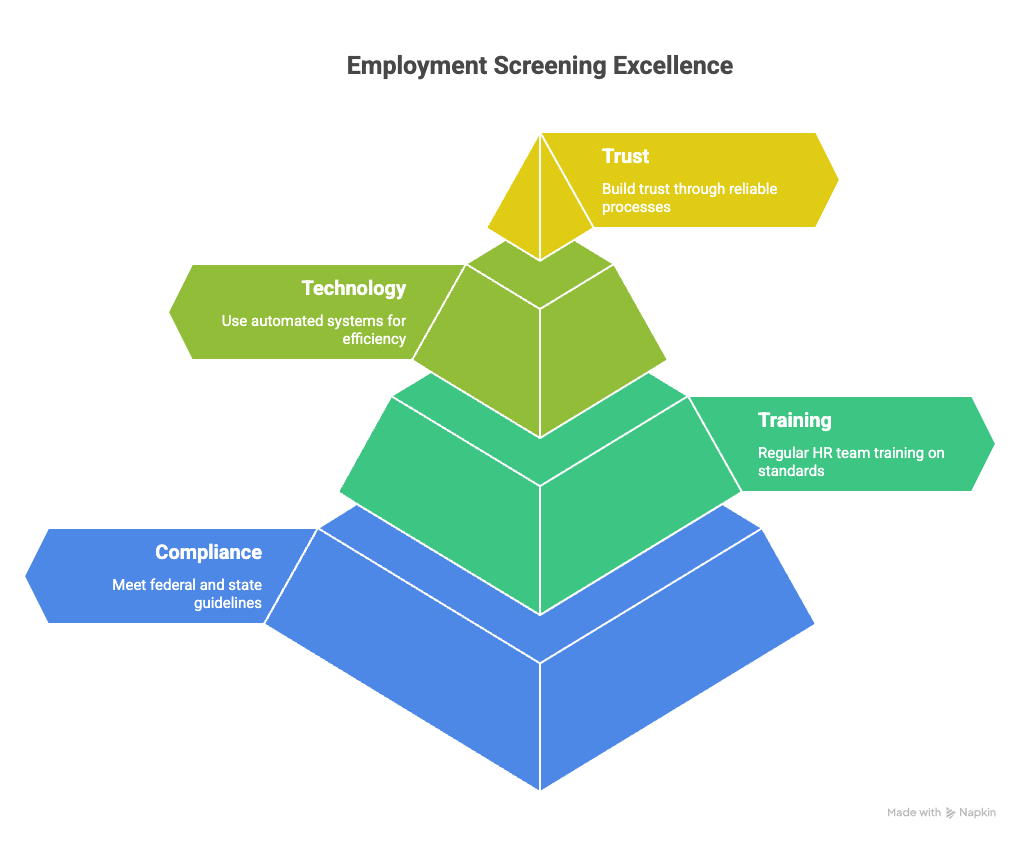In the competitive world of staffing, the key to standing out lies not just in finding candidates but in offering something moreâa compelling background check value proposition. This guide explores how you can leverage screening quality to differentiate your staffing firm in the marketplace. We'll dive into sales strategies, discuss the standards of employment screening, and reveal how to use these elements to drive client acquisition.
Key Takeaways
- Prioritize accurate and thorough background checks to build trust with clients and differentiate your staffing firm.
- Understand the limits and legal requirements of background checks to avoid legal issues and manage expectations.
- Develop a clear value proposition focusing on your firm's strengths in screening, using real-world examples and client testimonials.
- Tailor your sales pitch to different industries, demonstrating the impact of high-quality screenings on client businesses.
- Stay current with industry standards and use technology to enhance your screening process, ensuring compliance and efficiency.
Introduction
In staffing, differentiation matters. One way to stand out is by prioritizing background check quality. High-quality background checks reassure your clients of their hiring choices, creating trust. This focus is more crucial now than ever due to the rise in remote work and gig-based jobs, where verifying credentials and backgrounds helps maintain workplace integrity.
Focusing on background check quality allows your staffing firm to elevate its sales strategy. By emphasizing thorough and transparent screening processes, you capture client interest and build long-term partnerships. You gain a unique selling point that not only attracts clients but reinforces their loyalty. As you explore this approach, think about how well your current practices meet these expectations. What changes could enhance your firm's credibility in screening?
This article will elaborate on background check quality as a lever in your sales strategy. Whether youâre meeting compliance requirements or ensuring industry best practices, putting screening quality front and center can give your firm an edge.
Understanding Background Check Quality
A high-quality background check offers accuracy, thoroughness, and compliance. Precision is vital; errors can damage reputations and cost jobs. Thoroughness ensures all relevant details about a candidate are examined, minimizing risks. But it's not just about collecting dataâlegal compliance is critical too. Non-compliance can result in fines or lawsuits; hence knowing guidelines set by entities like the EEOC and FTC is crucial.
Many believe background checks can reveal everything, but that's not true. They have limits and can't provide certain information without consent, like medical records. Knowing what's feasible helps manage client expectations and avoid legal pitfalls. Focusing on these fundamentals can help your firm stand out by setting a standard of reliability and trust. Are you leveraging these standards to their full potential?
Developing a Strong Background Check Value Proposition
To carve out your niche in the staffing industry, start by identifying your firm's core strengths in background screening. Are you adept at quick turnaround times, or do you have access to more comprehensive databases than competitors? Knowing what you excel at is essential.
Once identified, crafting your message becomes key. Communicate these strengths clearly to potential clients. Emphasize transparency, thoroughness, and accuracy in your screening processes. Avoid industry jargon and stick to what matters most to themâreliable and insightful information about candidates.
Real-world examples can be compelling. Share case studies where your screening process uncovered critical information that helped clients make informed hiring decisions. Testimonials from satisfied clients serve as powerful endorsements of your service quality, building trust with new prospects.

As you develop your value proposition, ask yourself: What differentiates my firmâs background checks from others? How do these differences benefit clients? A clear and honest message can significantly influence potential clientsâ perception of your firmâs capabilities.
Integrating Screening Quality into Your Sales Strategy
Customization is crucial. Each client's needs vary, and so should your approach. Tailor your sales pitch to align with the specific industry or business type you're engaging with. For instance, a healthcare client may value thorough background checks due to compliance requirements. A tech startup might prioritize quicker turnaround times to snag top talent before competitors.
Show, donât tell. Demonstrate the real-world impact of superior screening. Share case studies where your accurate and thorough checks have prevented potential issues, saving clients from costly hiring mistakes. Highlight improvements in employee retention and satisfaction tied to your screening services. Clients appreciate data that showcases value.
Objections are inevitable. Address concerns about costs or time head-on. Position quality screening as an investment, not an expense. Explain how your checks protect their company reputation and reduce turnover, ultimately providing long-term savings. Share examples of quick, efficient processes that didn't compromise detail or accuracy.
Ask yourself and your clients: What matters most to them in a background check? Is it thoroughness, speed, or reliability? Knowing the answer helps you refine your pitch and drive home the message that your firm isn't just a staffing agencyâit's a partner committed to their success.
Employment Screening Standards and Best Practices
Current industry standards for background checks prioritize reliability and data protection. As an employer, you must ensure that the screening process meets both federal and state guidelines. Agencies like the EEOC and FTC provide valuable resources to guide compliance. Adopting a standardized approach ensures that your checks are consistent and defensible. This requires using verified data sources and conducting screenings that align with the positions you're filling.
Maintaining high screening standards starts with regular training for your HR team. Stay updated on legal changes to avoid litigation. Make sure everyone involved knows how to handle sensitive information securely and appropriately.
Implementing technological tools can greatly enhance your screening process. Automated systems not only speed up reviews but also reduce human error. Consider software that integrates with your HR systems for seamless data verification. This integration can be a game changer for managing large volumes of candidates without sacrificing accuracy.

These standards and practices are not just about risk managementâthey're also about building trust. An efficient, accurate background check process shows clients and candidates that your firm is serious about quality. This trust can be a powerful tool in client retention and acquisition. Remember, the reliability of your screening process is a reflection of your firm's overall integrity.
Staffing Client Acquisition Through Quality Assurance
To capture the interest of potential clients, you need a solid approach that highlights your focus on quality. Start by promoting your firm's commitment to thorough and reliable background checks as a key selling point. This sets a foundation for trust and positions your firm as a responsible and capable partner.
Developing trust with new clients revolves around transparency. Be upfront about your processes, costs, and timelines. Provide examples of past successes where high-quality screening has benefited other clients. This helps potential clients visualize the value they'll receive.
Competitive analysis is a crucial step. By understanding where your competitors fall short, you can emphasize your strengths. Whether it's faster turnaround times, higher accuracy rates, or stronger compliance with regulations, pinpoint what sets you apart and make it central to your pitch.
Building long-term client relationships requires consistent follow-up and performance reviews. Regularly check in with clients to ensure their satisfaction and adjust your services to meet their evolving needs. This ongoing dialogue enhances client retention and encourages word-of-mouth referrals.
Lead generation also thrives on quality assurance. Leverage client testimonials and case studies to showcase real-world results. These narratives serve as powerful endorsements, helping you connect with potential clients on a practical level.
Focusing on trust and quality assurance in your strategies can drive substantial gains in client acquisition and retention. Your firmâs emphasis on uncompromising standards not only attracts new business but also ensures clients remain satisfied and loyal over time.
Conclusion
Youâve explored the vital role of background check quality in staffing success. Prioritizing thoroughness, accuracy, and adherence to legal standards creates a compelling sales edge. It sets you apart in a crowded market. Itâs about building trust and showcasing commitment to quality. This can translate into increased client satisfaction and loyalty.
Now, take action. Reevaluate your screening processes. Enhance your sales strategy to spotlight your strengths in this area. Identify areas for improvement. Train your team. Ensure they understand how to convey the value of superior screening.
Looking ahead, the landscape of staffing will continue to evolve. Firms that maintain high standards in screening and use this focus as a differentiator will have an undeniable advantage. Your commitment to quality isnât just a sales toolâitâs a promise to your clients that they can count on. Keep that promise, and watch your firm grow into a trusted leader in the industry.
Frequently Asked Questions (FAQs)
How can screening quality help a staffing agency win more business?
High-quality screening ensures the right candidates are matched with client needs. This builds your agency's reputation, leading to repeat business and referrals. Clients prefer agencies that save them time and reduce hiring risks.
What makes a background check âhigh qualityâ?
A high-quality background check is thorough and precise, covering all necessary aspects such as criminal records, employment history, and education verification. It must comply with legal standards and be conducted swiftly to prevent delays.
How do staffing firms prove their screening process is better?
Staffing firms showcase success stories and client testimonials to demonstrate effectiveness. Offering transparent screening processes and certifications from reputable organizations also assures clients of the service's quality.
Is faster screening always better for staffing clients?
While speed is important, accuracy is crucial. A rushed screening can result in overlooking red flags, increasing the risk of a poor hire. Balancing speed with thoroughness is key for effective staffing.
What compliance risks come from low-quality screening?
Low-quality screenings can lead to non-compliance with laws and regulations, risking hefty fines. They may also result in hiring individuals with fraudulent backgrounds, causing reputational and financial damage.
How can you ensure candidate privacy during screening?
Use secure platforms for data collection and processing. Inform candidates about data usage and obtain their consent. Regularly update and monitor your privacy policies to align with industry standards.
What technology can enhance the screening process?
Incorporate AI and machine learning tools to automate repetitive tasks. These technologies can quickly analyze vast amounts of data, ensuring accurate and reliable results.
Why is regular training important for your screening team?
Training keeps your team updated on the latest screening techniques, tools, and legal requirements. It ensures consistent, high-quality results and adapts them to evolving industry standards.
How do industry partnerships improve screening quality?
Collaborating with trusted screening organizations enhances credibility and access to advanced resources. These partnerships strengthen your service reliability and expand your agency's capabilities.
Definitions
Background Check
A background check is the process of verifying a candidate's personal, educational, and professional history. This includes criminal records, employment verification, education, credit reports, and more. It helps employers confirm that the information provided is accurate and alerts them to any potential risks. Effective checks support informed hiring decisions and reduce the chance of future issues.
Compliance
Compliance refers to following legal and regulatory guidelines when conducting employment-related checks or activities. In the context of hiring, it means respecting federal and state laws, such as those from the EEOC and FTC, that protect candidate rights. Failing to comply can lead to legal action or reputational harm. Ask yourself: are your current screening practices legally sound?
Screening Process
The screening process includes all the steps taken to assess a candidate before hiring. This often involves reviewing resumes, conducting interviews, checking references, and running background checks. A solid screening process helps identify qualified candidates and avoid costly hiring mistakes. Think about where your current process succeeds â and where it might fall short.
Staffing Firm
A staffing firm connects employers with qualified workers. These agencies handle recruiting, vetting, and sometimes onboarding employees on behalf of clients. They play a key role in ensuring that only properly screened individuals are placed in roles. Your firmâs reputation depends heavily on the quality of your vetting.
Client Retention
Client retention is your ability to keep existing clients over time. It depends on delivering consistent value, meeting expectations, and maintaining trust. In staffing, high-quality screening services can improve retention by preventing hiring issues and reducing turnover. Do your current practices build long-term confidence with clients?
References
- CareerBuilder Study on Staffing & Background Screening
- BackgroundChecks.com Guidance for Staffing Agencies

GCheck Editorial Team
Meet the GCheck Editorial Team, your trusted source for insightful and up-to-date information in the world of employment background checks. Committed to delivering the latest trends, best practices, and industry insights, our team is dedicated to keeping you informed.
With a passion for ensuring accuracy, compliance, and efficiency in background screening, we are your go-to experts in the field. Stay tuned for our comprehensive articles, guides, and analysis, designed to empower businesses and individuals with the knowledge they need to make informed decisions.
At GCheck, we're here to guide you through the complexities of background checks, every step of the way.





